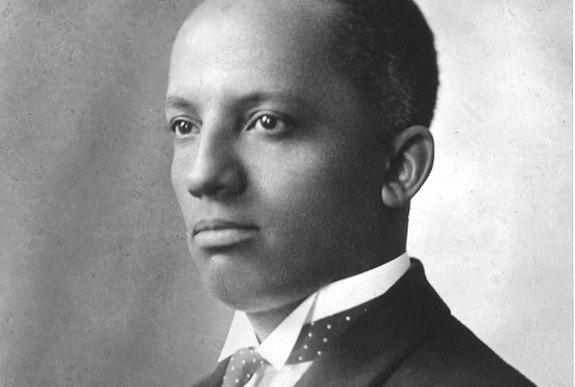
This photo of Dr. Woodson is in public domain, from Wikimedia Commons. We selected this photo for this column so that you can share this photograph yourself to promote Black History Month.
Clearing up confusion about Black History Month’s founder: Dr. Carter Godwin Woodson
FEBRUARY—As Joe Grimm—the head of the Bias Busters project at the Michigan State University School of Journalism—has had to point out this month: There’s a lot of confusion about Dr. Carter Godwin Woodson, widely regarded as the father of our custom of focusing on Black history each February.
Apparently, ignorance of this history led Target stores nationwide to stock a tragically mixed up Black History Month kit for kids, called the Civil Rights Magnetic Learning Activity. This kit mixed up several key figures, including Woodson, in a series of three images—and had to be pulled from stores nationwide. The error was never spotted by Target staff members. A history teacher bought one of the kits and immediately realized the errors, as reported by The New York Times, Forbes, People and many other news outlets. Only when it became a national embarrassment did Target remove the kits—and that’s a disappointing sign of ignorance of Black history, Joe Grimm has argued online.
Thank goodness Dr. Woodson has a robust biography in Wikipedia—including a photograph of him that is in public domain and can be shared easily by anyone wanting to correctly credit him as the father of this annual tradition. Consider taking a moment, right now, to share this column with friends via social media or email to help with the effort to correct the record.
To counter the confusion, Grimm has been sharing across the internet the following Question and Answer from the Bias Busters’ widely used book, 100 Questions and Answers About African Americans.
Question: What is Black History Month?
Answer: The idea had its origins in 1915. Carter G. Woodson, a Harvard PhD, and friends established the Association for the Study of Negro Life and History. The Journal of Negro History began a year later. In 1926, Woodson created Negro History Week to bring attention to history that was not in school curricula. Starting with Gerald R. Ford in 1976, U.S. presidents have annually recognized February as Black History Month. The United Kingdom and Canada observe it, as well. Some say Black history should be taught all year and that designating a month for it confines and diminishes Black history.
This answer and 99 others are in 100 Questions and Answers About African Americans, a Bias Buster guide created in a journalism class at Michigan State University. If that book interests you—then you also will want to get a copy of 100 Questions and Answers About the Black Church.
In researching, writing and editing these guides, Grimm and his students also work with blue-ribbon panels of national experts. The books are widely used by educators, community leaders and professionals nationwide to promote better understanding of the many minorities that make up our nation today. Amazon lists the entire series on this page.


Tell Us What You Think